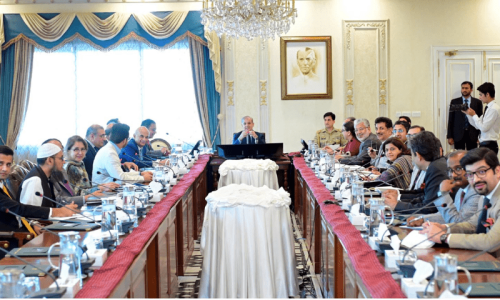KABUL: When President Hamid Karzai sacked Afghanistan's most powerful provincial governor and his own close rival at the weekend, protesters in the western city of Herat burned UN offices and stoned US and Afghan troops.
Up to seven protesters died in clashes with security forces, 50 were hurt and a curfew imposed, but US ambassador Zalmay Khalilzad, an Afghan American seen by many as the driving force behind Karzai's policies, appeared unperturbed.
Expressing optimism that the situation would improve, he told a news conference as UN buildings were being consumed by flames and dozens of aid workers huddled for safety in an American base: "We just have to ride out the initial bumps."
Some analysts, though, question US-led policy making ahead of presidential elections here on October 9, which are seen as a crucial test of US President George W. Bush's nation-building efforts before his own re-election bid in November.
Critics accuse Bush, desperate for a foreign policy success to balance the problems he faces in Iraq, of trying to fast-track polls in Afghanistan, whether or not the conditions to ensure they are free and fair have been put in place.
RISKY STRATEGY: They see the decision to replace Ismail Khan as governor of Herat just weeks before the election as part of that risky strategy and warn that it could backfire.
Vikram Parekh of the Brussels-based International Crisis Group think-tank said Khan's sacking by Karzai just after the president launched a manifesto in which he pledged to rein in regional warlords was a clear piece of electioneering.
"I think this was a matter of Karzai seeking political capital by being seen to get tough on commanders," he said. "But the point at issue is whether you have a better alternative to offer with sufficient local support. Otherwise you are simply going to end up destabilising the situation."
Khan's removal has been part of a broader strategy by Karzai to limit the influence of powerful commanders ahead of the polls. This includes the sidelining of Mohammad Qasim Fahim, his vice president and defence minister, who had expected to be chosen as Karzai's running mate but was unceremoniously dropped at the last moment and has now thrown in his lot with the incumbent's main rival, Yunus Qanuni.
Khalilzad hailed progress in creating what he calls "a new Afghanistan", saying that the Karzai administration had taken significant steps in terms of strengthening institutions and extending central government authority in recent months.
"I think it's sent a clear message of where Afghanistan is headed and how you can be part of the future of Afghanistan." But not everyone shares his optimism. Some point to the failure of a nation wide drive to disarm factional militias to make much progress ahead of the elections.
"I think it's been overstated," Parekh said of Khalilzad's assessment. "If these transfers had been well managed, you wouldn't have had the violent demonstrations we saw in Herat and there would have been more progress on disarmament."
Barbara Stapleton of the Agency Coordinating Body for Afghan Relief said its surveys showed the biggest concern Afghans have about elections is the continued existence of warlord militias and their ability to intimidate voters.
SLOW DISARMAMENT: The government has said it aims to disarm, demobilize and reintegrate 27,000 more factional fighters by Oct 8, but with only 14,000 disarmed since the process began last year, independent observers consider this a highly optimistic target.
"They will be holding elections in a highly militarized society in which power is under factional control," Stapleton said. Given the security worries created both by warlord armies and a continuing Taliban insurgency, Afghans will also go to the polls with insufficient numbers of independent monitors to judge whether the voting has been free and fair, she said.
Parekh said the replacement of Ismail Khan, who has one of the largest private militias in Afghanistan, could help speed the disarmament process in his province.
But at the same time there was a risk that commanders like Abdul Rashid Dostum, who is standing against Karzai for president, might feel their military power bases sufficiently threatened to form a political alliance against him with other contenders such as Qanuni.
"It may help the disarmament process in Herat, but it may also make commanders in some other areas, especially in the north, more reluctant to comply and fully disclose their weapons stocks," he said. -Reuters











































Dear visitor, the comments section is undergoing an overhaul and will return soon.